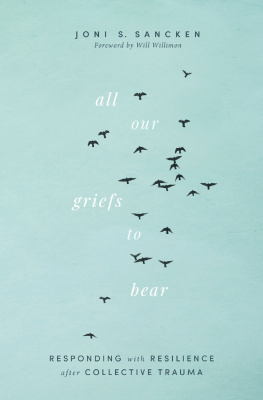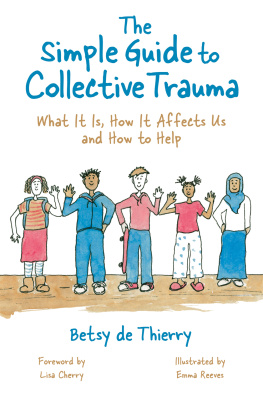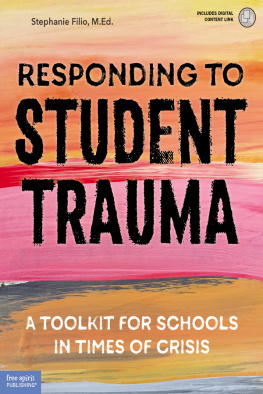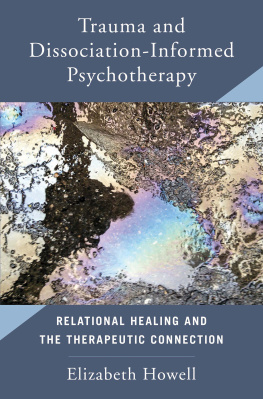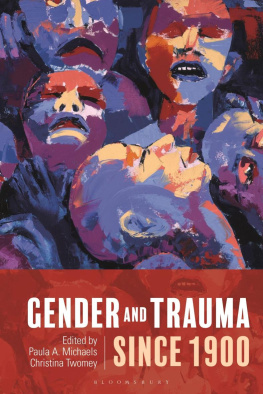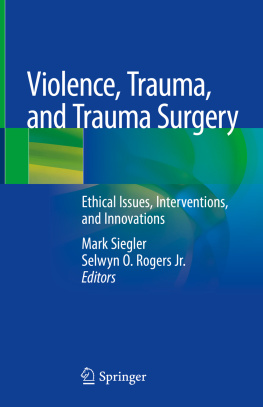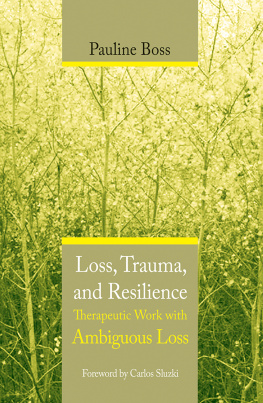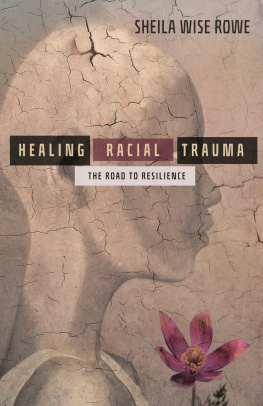Contents

Acknowledgments
T his book was conceived, gestated, and birthed during the difficult season in which our world has struggled in the grip of COVID-19 and many accompanying crises. I am thankful for the rich resiliency network in my life. The stress of this season deepens my gratefulness for those who love me and supported this project.
I am thankful to United Theological Seminary. I thank my faculty colleagues, Dean David Watson, President Kent Millard, and the Board of Trustees for their encouragement in the form of a sabbatical to focus on writing. I thank my students, particularly in the 2022 Work of Worship class, for experimenting with some of the ideas in the book.
I wish to thank Fairmont Presbyterian Church, who provided me a safe and quiet space for research and writing when my home was noisy with children and spouse working at home and my favorite writing spots were closed due to the pandemic. I am grateful to the pastoral team for fruitful conversation, particularly Brian Maguire, who offered encouragement and generously shared prayers and sermons. My life and this book are richer for these relationships.
I am grateful for many conversation partners. Thank you to my friends in the Lower Susquehanna Synod of the ELCA, Richard Jorgensen, Marsha Roscoe, Bishop James Dunlop, and clergy participants in the Bishops Convocation and certificate program in trauma-aware preaching. Thank you to Tom Boomershine for conversation around biblical storytelling, to Dick and Elise Eslinger for your ongoing friendship and insights particularly in worship, and to Casey Barton for numerous theological discussions by text. Thank you to Bob Howard for pointing me to a key resource early on, to UM Bishop Gregory Palmer and MC USA Central District Conference Minister Doug Luginbill for providing me opportunities and venues to share ideas with clergy, and to the participants in my workshops at Princeton Theological Seminarys Engle Institute of Preaching in 2021 and 2022.
I am thankful for the friendship and wisdom of Paul Wilson. I cant imagine my life without Pauls influence. His insights, keen editorial eye, and pastors heart greatly improved this book.
Thank you to the editors and team at Herald Press. It means a great deal to me to publish with a Mennonite press and to work with a team with shared history and commitments. Thank you to Sara Versluis and Laura Leonard for your encouragement and editing skills and to Amy Gingerich for supporting this project.
Finally, I thank my spouse Steve, children Maggie and Teddy, and my dear friend Emily Rodgers for their patience and love and for distractions and levity that offered much-needed balance amidst writing and researching about trauma. Steve has listened and offered feedback all along the way with his customary good humor.
The Author

J oni S. Sancken is professor of homiletics at United Theological Seminary in Dayton, Ohio. Her approach to preaching is theological and interdisciplinary. She is the author of Stumbling Over the Cross: Preaching the Cross and Resurrection Today (Cascade, 2016) and Words That Heal: Preaching Hope to Wounded Souls (Abingdon Press, 2019). Joni is an ordained pastor in Mennonite Church USA and completed two levels of training with STAR (Strategies for Trauma Awareness and Resilience) through the Center for Justice and Peacebuilding at Eastern Mennonite University in 2017 and 2021. She lives in Oakwood, Ohio, with her pastor husband Steve Schumm and children Maggie and Theodore.
ONE
Collective Trauma: A Wound We Share
O ur global experience of COVID-19 along with a cascade of associated crises has made the study of collective trauma relevant to all of us. The COVID pandemic is a wound humanity shares, although perspectives and experiences vary widely. In an article in The Atlantic , Melissa Fay Greene asks, How will we remember the pandemic? She notes that this experience has not been the traumatic flashbulb moment of an assassination or terrorist attack; rather, it is a periodstill ongoingin which our individual life memories are embedded. We may ask each other, When did the pandemic begin for you?
For me, it began on my birthday, March 12, 2020. In the morning, I enjoyed an indulgent special coffee drink at my local coffee shop with my husband while we asked ourselves if it was really safe to be there. There were only a few of us in the normally bustling space. As the day unfolded, we got news that my daughters grade school and sons preschool would be closing. My husband decided to close his church. My seminary classes would also be moving online. We went to a bakery to pick up my cake, the last time our family of four would go into a public space together for more than a year. My husband went to pick up pizza from our favorite restaurant and I sat on the porch swing surveying our neighborhood with a sense of fear and foreboding. New green leaves and daffodils displaying a sense of hope and future growth that I did not share.
Many of us have felt alone and lonely during this season of pandemic and racial reckoning, separated from many places of connection, support, discernment, and meaning. In the United States, individuals have had the burden of making decisions about risk, although because both COVID-19 and racism are community pandemics, our decisions affect others and the actions of others affect us.
At this point, more than two years after shutdowns and intense racial reckoning, crisis seems like an understatement to describe our world. The word trauma carries some freight. Trauma refers to circumstances in which ones own life or the life of a loved one is under threat, where one loses a loved one suddenly, or when the ability to process the experience is exceeded by the magnitude of the experience itself. Symptoms related to experiences of traumadigestive changes, bouts of crying, difficulty remembering things and making decisions, elevated blood pressure, and changes in attention spanare the bodys way of processing the trauma and dispelling energy created by the flight-fight-freeze response. Trauma responses become especially corrosive when we get stuck. This can happen when our bodies dont fully process the traumatic energy or when trauma is chronic and ongoing.
The global experience of COVID-19 means that everyone in the world to some degree has suffered trauma. Individuals, families, congregations, and communities have dealt with this trauma in varying ways and with diverse levels of resilience.
Trauma can cause physical, social, spiritual, and mental harm to people and groups. Trauma siphons away energy and imagination and can deepen polarization and fragmentation. Trauma isolates and makes bodies both individual and collective more susceptible to illness, pain, and brokenness. As we collectively deal with the fallout from the pandemic, political unrest, and social and economic upheaval, the effects of prolonged traumatic stress continue to cascade through our families, communities, and world. Many of us are feeling lost, overwhelmed, and depleted.
This chapter explores aspects and experiences of collective trauma and resilience to help leaders recognize symptoms and behaviors that may be linked to traumatic stress in congregations and other organizations. The following chapters will unpack practices and tools for congregations and individuals to process collective trauma.
Conceptualizing trauma
You might hear that word, trauma , and think, That doesnt apply to me! The word trauma means wound and is primarily used to refer to involuntary physical stress-related responses to stressors and events that exceed our individual or communal abilities to process them.

